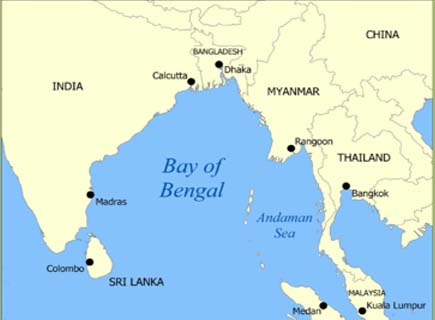
Economic Importance of the Bay of Bengal
The Bay of Bengal holds significant economic importance for the countries surrounding it, including India, Bangladesh, Myanmar, and Sri Lanka. With a combined population of nearly 1.78 billion and a GDP of approximately $7.5 trillion, this region has the potential to become a thriving economic hub in South Asia.
One of the most crucial aspects of the Bay of Bengal is its strategic trade routes. Approximately 90% of global trade occurs via sea, and a significant portion of this takes place in the Indian Ocean, with the Bay of Bengal serving as a key artery. This makes it essential for resource management, particularly in terms of natural resources like fisheries and hydrocarbons.
Currently, the fishing industry is a major contributor to the economy, with Bangladesh harvesting only a fraction of the estimated 8 million tons of fish available in the Bay. The potential for deepsea fishing remains largely untapped, which could significantly boost exportimport activities. Moreover, Bangladesh’s coastline provides a vast opportunity for tourism, especially with the development of coastal areas and resorts.
Economic Importance of the Bay of Bengal
In recent years, there has been a surge in infrastructure development to facilitate better logistics and connectivity. Projects like the deep seaport in Matarbari are expected to reduce transportation costs and improve access to global markets. As countries begin to prioritize economic integration, the Bay of Bengal can serve as a vital link between South Asia and Southeast Asia, enhancing bilateral relations among nations.
Furthermore, maritime security is crucial for the stability of this region. Countries must work together to address issues like drug smuggling, piracy, and pollution, ensuring a safe environment for economic activities. By fostering community engagement and sustainable practices, the Bay of Bengal can become a model for other regions.
The challenges posed by geopolitical dynamics also play a role in the Bay of Bengal’s economic significance. With global powers vying for influence, Bangladesh is strategically positioning itself to benefit from these investment opportunities without becoming embroiled in international conflicts. The country’s policy of peaceful coexistence allows it to maintain good relations with all major players, ensuring its economic interests are safeguarded.
Ultimately, the Bay of Bengal’s potential for economic diversification and resilience is immense. By building capacity in various sectors, from oceanography to maritime laws, countries can better utilize their resources and navigate the complexities of global trade. In conclusion, the Bay of Bengal represents not only a geographical feature but a pivotal space for economic growth, cultural exchange, and international cooperation.
বঙ্গোপসাগরের অর্থনৈতিক গুরুত্ব
বঙ্গোপসাগর তার চারপাশের দেশগুলোর জন্য, যেমন ভারত, বাংলাদেশ, মিয়ানমার, এবং শ্রীলঙ্কার জন্য, গুরুত্বপূর্ণ অর্থনৈতিক গুরুত্ব বহন করে। প্রায় ১.৭৮ বিলিয়ন জনসংখ্যা এবং প্রায় ৭.৫ ট্রিলিয়ন ডলারের জিডিপি নিয়ে, এই অঞ্চল দক্ষিণ এশিয়ায় একটি উন্নত অর্থনৈতিক কেন্দ্র হিসেবে গড়ে উঠার সম্ভাবনা রাখে।
বঙ্গোপসাগরের সবচেয়ে গুরুত্বপূর্ণ দিকগুলোর একটি হলো এর কৌশলগত বাণিজ্য পথ। প্রায় ৯০% বৈশ্বিক বাণিজ্য সাগরের মাধ্যমে ঘটে, এবং এর একটি বড় অংশ ভারতীয় মহাসাগরে ঘটে, যেখানে বঙ্গোপসাগর একটি প্রধান রক্তনালী হিসেবে কাজ করে। এটি সম্পদ ব্যবস্থাপনায় অপরিহার্য, বিশেষ করে প্রাকৃতিক সম্পদ যেমন মৎস্য এবং হাইড্রোকার্বন।
বর্তমানে, মৎস্য শিল্প অর্থনীতির একটি প্রধান অবদানকারী, যেখানে বাংলাদেশ বঙ্গোপসাগরের প্রায় ৮ মিলিয়ন টন মাছের মধ্যে মাত্র একটি অংশ আহরণ করে। গভীর সমুদ্রের মাছ ধরার সম্ভাবনা এখনও পুরোপুরি অনুসন্ধান করা হয়নি, যা রপ্তানিআমদানি কার্যক্রমকে উল্লেখযোগ্যভাবে বৃদ্ধি করতে পারে। উপরন্তু, বাংলাদেশের উপকূল রিসোর্ট এবং পর্যটন উন্নয়নের জন্য একটি বিশাল সুযোগ প্রদান করে।
সাম্প্রতিক বছরগুলোতে, অবকাঠামো উন্নয়ন বৃদ্ধি পেয়েছে যাতে লজিস্টিক্স এবং সংযোগ উন্নত হয়। মাতারবাড়িতে একটি গভীর সমুদ্র বন্দর প্রতিষ্ঠা করলে পরিবহণের খরচ কমানোর পাশাপাশি বৈশ্বিক বাজারে প্রবেশ সহজ হবে। দেশগুলো অর্থনৈতিক সংহতির দিকে অগ্রসর হলে, বঙ্গোপসাগর দক্ষিণ এশিয়া এবং দক্ষিণপূর্ব এশিয়ার মধ্যে একটি গুরুত্বপূর্ণ সংযোগ হিসেবে কাজ করতে পারে, জাতিগুলোর মধ্যে দ্বিপাক্ষিক সম্পর্ক বাড়িয়ে।
এছাড়াও, সামুদ্রিক নিরাপত্তা এই অঞ্চলের স্থিতিশীলতার জন্য গুরুত্বপূর্ণ। দেশগুলোকে মাদক পাচার, জলদস্যুতা, এবং দূষণ মোকাবেলায় একসাথে কাজ করতে হবে, যাতে অর্থনৈতিক কার্যক্রমের জন্য একটি নিরাপদ পরিবেশ নিশ্চিত করা যায়। সম্প্রদায়ের সম্পৃক্ততা এবং টেকসই চর্চা উন্নীত করে, বঙ্গোপসাগর অন্যান্য অঞ্চলের জন্য একটি উদাহরণ হতে পারে।
বঙ্গোপসাগরের অর্থনৈতিক গুরুত্ব
ভূরাজনীতির কারণে আগ্রহী বিশ্ব শক্তিগুলোর প্রভাবও বঙ্গোপসাগরের অর্থনৈতিক গুরুত্বে একটি ভূমিকা পালন করে। বিশ্ব শক্তিগুলো নিজেদের প্রভাব বিস্তারের জন্য লড়াই করলেও, বাংলাদেশ কৌশলগতভাবে নিজেদের অবস্থানকে শক্তিশালী করতে পারছে। দেশের শান্তিপূর্ণ সহাবস্থান নীতি এটিকে সকল প্রধান পক্ষের সাথে সুসম্পর্ক বজায় রাখতে সাহায্য করছে, যাতে তার অর্থনৈতিক স্বার্থ রক্ষা পায়।
সবশেষে, বঙ্গোপসাগরের অর্থনৈতিক বৈচিত্র্য এবং স্থিতিস্থাপকতার সম্ভাবনা বিশাল। বিভিন্ন খাতে সক্ষমতা বৃদ্ধি করে, যেমন মহাসাগরবিদ্যা থেকে সামুদ্রিক আইন, দেশগুলো তাদের সম্পদের সদ্ব্যবহার করতে এবং বৈশ্বিক বাণিজ্যের জটিলতাগুলোতে নেভিগেট করতে পারে। উপসংহারে, বঙ্গোপসাগর কেবল একটি ভৌগলিক বৈশিষ্ট্য নয়, বরং অর্থনৈতিক বৃদ্ধির, সাংস্কৃতিক বিনিময়ের, এবং আন্তর্জাতিক সহযোগিতার জন্য একটি কেন্দ্রবিন্দু।
Vocabulary
- Economic Growth: অর্থনৈতিক বৃদ্ধি
- Trade Routes: বাণিজ্য পথ
- Resource Management: সম্পদ ব্যবস্থাপনা
- DeepSea Fishing: গভীর সমুদ্র মৎস্য আহরণ
- ExportImport: রপ্তানিআমদানি
- Infrastructure Development: অবকাঠামো উন্নয়ন
- Maritime Security: সামুদ্রিক নিরাপত্তা
- Environmental Sustainability: পরিবেশগত স্থায়িত্ব
- Logistics: লজিস্টিকস
- Coastal Areas: উপকূলীয় এলাকা
- Natural Resources: প্রাকৃতিক সম্পদ
- Fishing Industry: মৎস্য শিল্প
- International Relations: আন্তর্জাতিক সম্পর্ক
- Economic Integration: অর্থনৈতিক একীকরণ
- Cultural Exchange: সাংস্কৃতিক বিনিময়
- Strategic Importance: কৌশলগত গুরুত্ব
- Trade Agreements: বাণিজ্য চুক্তি
- Economic Hub: অর্থনৈতিক কেন্দ্র
- Investment Opportunities: বিনিয়োগের সুযোগ
- Bilateral Relations: দ্বিপাক্ষিক সম্পর্ক
- Sustainable Practices: টেকসই চর্চা
- Capacity Building: সক্ষমতা উন্নয়ন
- Maritime Laws: সামুদ্রিক আইন
- Oceanography: মহাসাগরবিদ্যা
- Supply Chains: সরবরাহ চেইন
- Economic Diversification: অর্থনৈতিক বৈচিত্র্য
- Community Engagement: সম্প্রদায়ের সম্পৃক্ততা
